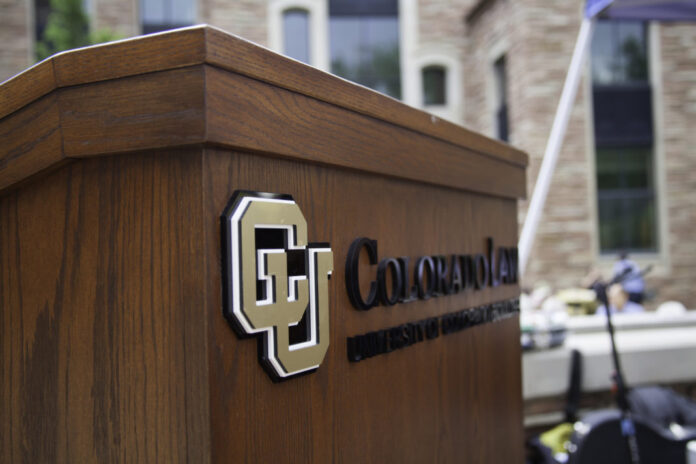
Law students and members of the Colorado legal community convened in Boulder on Oct. 24 for the University of Colorado Law School’s annual John Paul Stevens Lecture.
The event brings distinguished jurists from across the country to the university, and the list of speakers has included U.S. Supreme Court justices, state Supreme Court justices and even a high court justice from another country.
This year’s lecture brought Fifth Circuit Court of Appeals Judge Stephen Higginson to the school. Higginson is a presiding judge of the Foreign Intelligence Surveillance Court of Review. Early on in Higginson’s career, he was a law clerk for Colorado’s first Supreme Court justice, Byron White.
Higginson’s lecture looked back nearly eight decades, as he spoke about his research on the Nuremberg trials, where the allied forces of World War II tried 24 high-ranking Nazi officials, ultimately sentencing 11 to death.
The message he wanted to impart to the students and legal professionals in the room through the lecture was that the peril of affiliation is equal to or greater than the peril of indifference.
To begin his lecture, Higginson asked the room to imagine that they were born at the beginning of the 20th century to a German-speaking family in Europe, and were unable to escape the region.
“That could mean that you ended up as a graduate student in Germany, living in an imperiled democracy, but you are unaware of that,” Higginson said. “The world around you seemed Manichean, cleaving into a choice between extremes.”
He said that every defendant at Nuremberg made the choice to affiliate with an extreme, and that the choice wasn’t made out of ignorance or indifference.
“They largely made it out of ambition, the consequence of which, too late, two decades later, put them on trial and led many to execution,” Higginson said.
He noted that their allegiance to the Nazi party gave the Nuremberg defendants brutal professional advantages. He focused on two specific defendants from the trial in his lecture, a judge and a doctor. The doctor, he said, was complicit in human experiments and genocide, and the judge had sent over 100 defendants to execution.
“The underlying tragedy is the same story of professionals affiliating with violent nationalists out of ambition, leading to servitude, political capture and disfigurement,” Higginson said.
He told the room that the purpose of the story was to show how two professions, including the legal profession, collapsed in a short period of time.
“My conclusion is that both professions collapsed because lawyers and doctors and judges chose to affiliate out of ambition, and that choice led to a world war, to the Holocaust and ultimately to Nuremberg on charges of crimes against humanity,” Higginson said.
He told the students and professionals to always resist political affiliation to any group that denigrates others.
Coming back to the U.S., Higginson said that the U.S. Constitution asks for very few judicial affiliations. “To administer justice without respect to persons, to do equal right to the poor and rich and to faithfully and impartially discharge and perform all duties incumbent under the Constitution,” Higginson said.
In addition to that, in Article VI, Higginson notes that there is just one verb in its command to federal and state officials, including judges: to support the constitution. “Now, for another lecture on the peril of affiliation, it’s interesting to me that the clause doesn’t say to interpret, it says to support,” Higginson said.
But Higginson noted that when he cautions about affiliation, he also isn’t naive. When asked about the corrections to the peril of affiliation, Higginson told the room that the best way to avoid it is to be a superb lawyer.
“If you’re a terrific lawyer, you will be able to topple servitudes, biases, whatever word you want to give to it,” Higginson said. And he encouraged great lawyers to become great judges.
He also encouraged law students, professors and legal professionals to criticize judges, be vigilant about their work, scrutinize their opinions and put pressure on the judiciary and its code of conduct committee.

